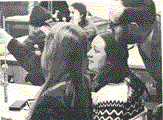ADAPT Program (Accent on Developing Abstract Processes of Thought)

ADAPT Program: Essays
Date of this Version
November 1982
Abstract
The death of Jean Piaget this month at the age of 84 came at a time when the Swiss psychologist's theories of cognitive development were inspiring a small but growing number of innovative instructional programs in American colleges and universities. Most were started within the past few years and have yet to produce much hard evidence of their effectiveness. But participating faculty members say they are excited about what has been happening in their classrooms.
"Piagetian-based instruction," they say, offers many potential advantages over traditional methods: It facilitates communication, improves students' reasoning ability and academic achievement, boosts their self-confidence and interest in their work, and provides a practical basis for integrating different subjects in a curriculum through a common emphasis on cognitive skills.
Preliminary research findings indicate that students in such programs make significantly greater gains on tests of critical thinking than do their counterparts in other classes. Teachers also report that attendance is up and attrition is down for students in the special classes, which encompass many disciplines in both the sciences and the humanities.
"It's a movement that is coming in higher education," says one enthusiast. So far about a dozen colleges are conducting formal Piagetian programs, while faculty members at a number of other institutions are believed to be drawing on Piaget independently in their teaching. The formal programs, which range from a single course to a full year of study, have attracted financial support from the federal government and private foundations.


Comments
Published in The Chronicle of Higher Education, Volume XXI, Number 6 (September 29, 1980), pp. 5-6. Copyright 1980 The Chronicle of Higher Education.
This was the last article in the ADAPT book of essays for 1982.